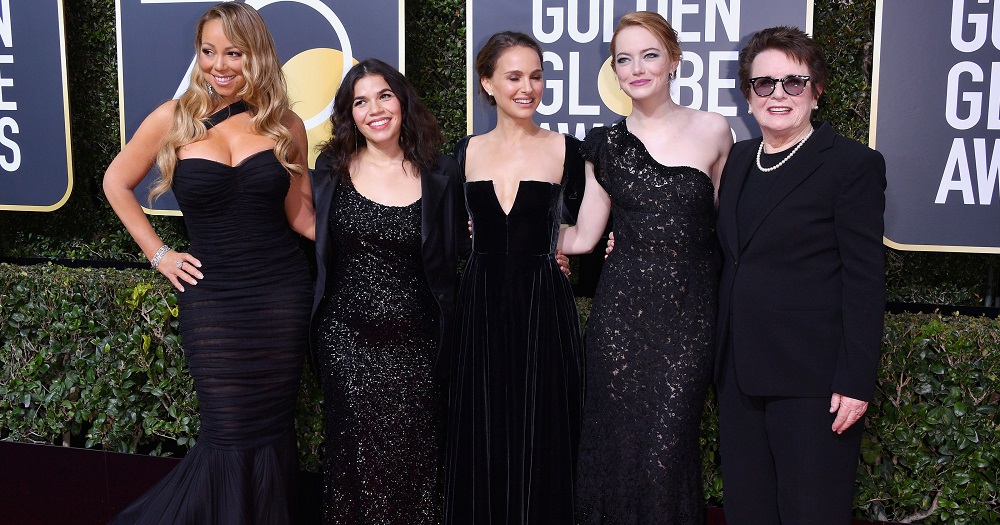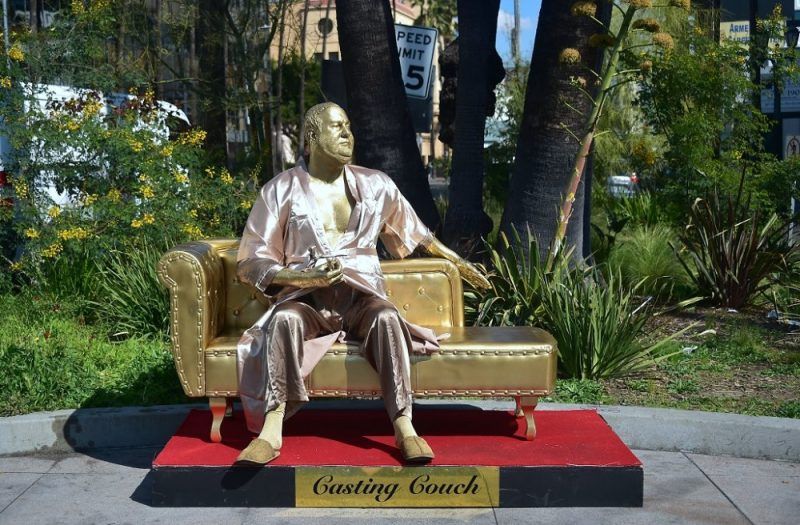
Awards season has seen the Time’s Up movement showing up, and the 2018 Academy Awards will be no different.
Rather than becoming just “an awards show protest group,” according to “Wrinkle in Time” director Ava DuVernay,” they will be given ‘a moment’ during the Oscars telecast.
The organizers of Time’s Up say the movement to eradicate discrimination in the workplace will have a presence at Sunday’s Oscar show, but there are no plans for a red-carpet dress code.
Shonda Rhimes, Ava DuVernay, actresses Laura Dern and Tessa Thompson, producer Katie McGrath and attorney Nina Shaw talked about the movement’s progress and next steps with news reporters Thursday.
They stressed that while Time’s Up made a splashy appearance at the Golden Globes earlier this year, with most women wearing black and several actresses walking the red carpet with activists, the movement is bigger and broader than awards shows.
“We’re trying to build something that’s sustainable, lasting and serious,” DuVernay said Thursday at the meeting at the Sunshine Sachs publicity firm’s offices in West Hollywood, California.
Time’s Up was “launched on the red carpet, but was never intended to live there,” Rhimes said.
Besides the black dresses at the Globes, Time’s Up supporters wore white roses at the Grammy Awards. No such uniformity is planned for the Oscars.
Formed after the Harvey Weinstein scandal revealed widespread sexual harassment in Hollywood, Time’s Up has grown into an international, multifaceted and multipronged approach to fighting workplace discrimination, organizers said. They outlined the various avenues of the effort at Thursday’s news conference.
A key element is the legal defense fund, which has amassed $21 million and scores of attorneys to date. In partnership with the National Women’s Law Center, the fund connects victims of harassment or discrimination with attorneys, who are either volunteering their services or having their fees underwritten by donations.
Since Time’s Up was founded about two months ago, it has received some 1,700 requests for legal assistance, said attorney Tina Tchen, a lawyer and former director of the White House Council on Women and Girls. More than 1,200 of those cases have already been referred to attorneys, she said.
The movement may have started in Hollywood, but it’s become global, Rhimes said, with participation in Kenya, South Korea, Pakistan, and Kuwait. From the tech sector to farm workers, women are coming together to demand fair treatment, she said.
“The intention really is that a large portion of our leadership will come from other industries,” Rhimes said.
Representatives for farm, domestic and restaurant workers have been actively involved in the expanding movement, she said.
On Friday, Time’s Up is announcing its new StoryCorps initiative. StoryCorps is a storytelling collective that invites ordinary people to share tales from their lives, which are eventually uploaded into a Library of Congress collection aimed at fostering greater human understanding. The Time’s Up partnership invites women and men to share stories about their lives at work.
It’s not just about sexual harassment, organizers said, but about illuminating what it takes to create fair and equitable workplaces where people of all races, genders, and ethnicities are recognized and valued. It’s about seizing on the momentum generated by the outrage over Weinstein and those like him and channeling it toward change.
Branches of the Time’s Up movement have been meeting regularly since the beginning of the year. Various sectors of the initiative are dealing with men, people of color and people overseas, organizers said.
Hollywood men have held their own Time’s Up meetings, organizers said, and international outreach continues to grow.
No invitation is needed to participate, either, they said. Like all grass-roots movements, it grows with personal interest.
“There’s actual work being done,” DuVernay said. “It’s not just a press opportunity… It’s not just an awards-show protest movement.”
A golden statue of a bathrobe-clad Harvey Weinstein, seated regally atop a couch with an Oscar in hand, took up temporary sidewalk residence close to the site of Sunday’s Academy Awards.
“Casting Couch” is a collaborative work between a Los Angeles street artist known as Plastic Jesus and Joshua “Ginger” Monroe, designer of 2016′s nude Donald Trump statues placed in major U.S. cities.
The life-sized Weinstein sculpture, displayed Thursday on Hollywood Boulevard, aims to spotlight the entertainment industry’s sexual misconduct crisis and the disgraced studio mogul’s role in it, Plastic Jesus said.
“There’s so much about Hollywood that’s great and celebrated in the Oscars, but there’s also this underbelly of darkness within the industry that we often sweep under the carpet or ignore,” said Plastic Jesus, formerly a London-based photographer.
The phrase “casting couch,” used to describe the demand of sexual favors for work, may seem a relic of a bygone era but is “still very much a part of the Hollywood culture,” he said.
Plastic Jesus said he and Monroe first considered a standing Weinstein statue but quickly decided to incorporate a chaise lounge. The project, made of fiberglass and acrylic resin, was in the works for two months.
It will be on display this weekend, weather permitting.
Visitors to the sculpture were sitting next to the faux Weinstein and taking selfies, turning it into an interactive installment, Plastic Jesus said.
It also expands the symbolism, he said.
“For many, many people, aspiring actors and actresses, that would have been their dream to be close to Harvey,” but that reality has proven a nightmare for some, the artist said.
Weinstein has been accused by dozens of women of sexual harassment or sexual assault, including rape. He’s denied all allegations of non-consensual sex, but apologized for “the way I’ve behaved with colleagues in the past.”
Plastic Jesus has created a series of Oscar-timed statues, including one last year of Kanye West in a crucified pose and titled “False Idol.”


